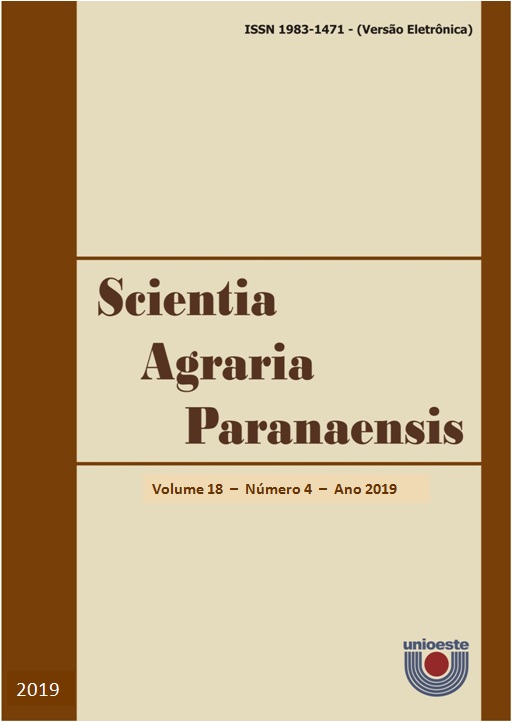Jatropha curcas seed tolerance to desiccation and storage at low temperatures
DOI:
https://doi.org/10.18188/sap.v18i4.22682
Agências de fomento
FAPERJ and CAPES
Resumo
Jatropha seeds were classified according to tolerance to desiccation and storage, as a way to subsidize future propagation programs, as jatropha seed shows to be a promising oilseed for biodiesel production. The objective of this work was to study the physiological classification regarding the tolerance of physic nut seeds to desiccation and storage at low temperatures and to verify if their behavior was closer to that of seeds classified as orthodox, recalcitrant or intermediate. The seeds were harvested in the morning and sent to the Laboratory, being processed and submitted to drying, storage and emergency assessment. For seed quality analysis, the germination test and the emergence speed index were used, using a completely randomized design, with four treatments (no drying, 12% humidity, 5% humidity and 12% humidity a -20ºC for 90 days) and five repetitions. After physiological classification, it was found that seeds of physic nut are orthodox, thus can be stored at low temperature (-20ºC) and with low water content (<5%), without compromising their viability.Downloads
Publicado
15-12-2019
Como Citar
DARDENGO, A. O.; VIEIRA, H. D.; DEMINICIS, B. B.; BERBERT, P. A.; OLIVEIRA, M. T. R. de. Jatropha curcas seed tolerance to desiccation and storage at low temperatures. Scientia Agraria Paranaensis, [S. l.], p. 396–400, 2019. DOI: 10.18188/sap.v18i4.22682. Disponível em: https://e-revista.unioeste.br/index.php/scientiaagraria/article/view/22682. Acesso em: 24 dez. 2025.
Edição
Seção
Artigos Científicos
Licença
Aviso de Direito Autoral Creative Commons
Política para Periódicos de Acesso Livre
Autores que publicam nesta revista concordam com os seguintes termos:
1. Autores mantém os direitos autorais e concedem à revista o direito de primeira publicação, com o trabalho simultaneamente licenciado sob a Licença Creative Commons Attribution que permite o compartilhamento do trabalho com reconhecimento da autoria e publicação inicial nesta revista.2. Autores têm autorização para assumir contratos adicionais separadamente, para distribuição não-exclusiva da versão do trabalho publicada nesta revista (ex.: publicar em repositório institucional ou como capítulo de livro), com reconhecimento de autoria e publicação inicial nesta revista.
3. Autores têm permissão e são estimulados a publicar e distribuir seu trabalho online (ex.: em repositórios institucionais ou na sua página pessoal) a qualquer ponto antes ou durante o processo editorial, já que isso pode gerar alterações produtivas, bem como aumentar o impacto e a citação do trabalho publicado (Veja O Efeito do Acesso Livre).
Licença Creative Commons
Esta obra está licenciada com uma Licença Creative Commons Atribuição-NãoComercial-CompartilhaIgual 4.0 Internacional, o que permite compartilhar, copiar, distribuir, exibir, reproduzir, a totalidade ou partes desde que não tenha objetivo comercial e sejam citados os autores e a fonte.


